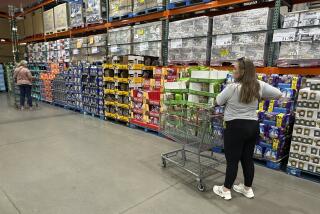High gas prices hit consumer spending
- Share via
WASHINGTON — Consumer spending rose at the weakest pace in five months in March as a surge in gasoline prices left shoppers with little for other items.
The Commerce Department reported Monday that consumer spending on all items was up 0.3% in March from the previous month, the slowest increase since a similar rise in October. That lackluster gain came even though personal income rose by a healthy 0.7% in March.
The spending performance was even weaker when the effects of higher gasoline prices were removed. After adjusting for price increases, consumer spending fell by 0.2% in March, the poorest showing since September 2005, when the U.S. economy was suffering the aftershocks of Hurricane Katrina.
“People spent more in March but may be enjoying it less as the rising price of energy is cutting into what they actually take home,” said Joel Naroff, chief economist at Naroff Economic Advisors, a private consulting firm.
The weaker-than-expected consumer spending added to worries that the economy could be in danger of stalling if consumer confidence falters further in the face of rising gasoline prices and a slumping housing market.
“Unless spending posts unusually large gains in May, the second-quarter consumption number is practically guaranteed to be awful,” said Stephen Stanley, chief economist at RBS Greenwich Capital.
He predicted that consumer spending would rise at an annual rate of around 1%, far below the 3.8% rate of spending growth in the January-March quarter.
A second Consumer Department report Monday showed that construction spending edged up a slight 0.2% in March. Spending on housing construction fell for an 11th month out of the last 12, but this was offset somewhat by increases in spending on hotels and other nonresidential projects and on government construction. In addition, construction activity in February was revised up significantly to growth of 1.5%, five times the initial estimate of 0.3% growth.
Analysts said this big increase would contribute to an upward revision in gross domestic product for the first quarter to around 1.5% or 1.6%.
In another sign of the slowdown in housing, the National Assn. of Realtors reported Monday that purchases of second homes for investment purposes fell by a sharp 28.9% last year to an annual rate of 1.65 million units, while sales of vacation homes managed a 4.7% increase to a record 1.07 million units.
Sales of vacation properties and investment homes accounted for 36% of all existing and new-home sales last year, down from 40% in 2005, the peak of the five-year housing boom, the Realtors reported.
A price gauge tied to consumer spending was unchanged in March, after excluding the effects of gasoline and food. This meant that core inflation as measured by personal consumption spending was up by just 2.1% for the last 12 months, much better than the worrisome 2.4% jump recorded for the 12 months that ended in February.
More to Read
Inside the business of entertainment
The Wide Shot brings you news, analysis and insights on everything from streaming wars to production — and what it all means for the future.
You may occasionally receive promotional content from the Los Angeles Times.










